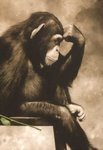Most of Complementary and Alternative Medicine is built on a house of cards
A nicely worded post at Panda Bear, MD succinctly describes many of the problems I have encountered through the years while attempting to put my finger on just how alternative medicine is defined. Many personal discussions with alternative practitioners and fairly extensive research of alternative medicine texts has continually left me with no real tangible how, when, and why answers.
"Almost everything about Complementary and Alternative Medicine (CAM) is bunk and its purveyors are at best deluded and at worst quacks and charlatans who would make the snake oil salesmen of olden days blush from shame. Maybe a hundred years ago you could make a case for magic potions and mysterious cures from the East but today we should know better and only don’t because of a combination of scientific illiteracy and an ingrained bias against rational Western thought. What little benefit patients can derive from most of the quackery being sold to them is not worth a fraction of the money spent and the same effects could be achieved without the smoke and mirrors if people paid as much attention to diet, exercise, and all around clean living as they do to looking for an easy fix."
Unfortunately, this mirrors my experience in the veterinary world as many clients, swayed by their own perceptual biases, often search out these fallacious "other ways of knowing". I would like to make it clear that science based medicine is not perfect, nor does it have all the answers. Additionally, we need to consider all medicine as one concept, and look at all of it with the same critical attitude. Alternative Medicine steers clear of this rigorous approach and it became clear to me why as I realized it is mostly nothing more than myth, belief, and nostalgic notions of ancient wisdom.
"CAM exists in an alternate universe from real medicine. It wants to be legitimate but manages to avoid the responsibilities and liability of real medical practice. As most CAM treats nebulous symptoms with equally nebulous modalities, there is no measurable standard for efficacy of any of the treatments. "
This is one of the key problems that I have run into time and again. How can we know that what we are doing as practitioners is doing any good without having a reliable mechanism to steer our often imperfect attempts at helping and healing the sick?
"The real medical profession while imperfect like all human endeavors is not so conservative that ineffective or ridiculous therapies are not discarded. This is the whole basis of evidence based medicine. There is no evidence based Complementary and Alternative Medicine. It exists in the absence of and often despite the evidence. When challenged, its practitioners will retreat like the sweaty televangelists to anecdotes and testimonials. Either that or they will cite the placebo effect, that last hope and refuge of medical scoundrels and upon which rock they will cling as their last handhold in the rational world."
What is often not realized by many, is just how seriously many of these modalities have been and are considered, analyzed, and tested by "traditional" medicine. That they are mostly discarded is a function of efficacy, plausibility, results, and repeatability.
Another growing issue that needs confronted are the many implausible approaches are sucking up precious monies that could be better spent in other ways. For example, the current federal allocation for the National Center for Complementary and Alternative Medicine (NCCAM)is around $110 million/year. The NCCAM has had among its research agenda projects related to cranial osteopathy, in vitro investigation of distant Qi Gong, Gonzales therapy for cancer (consisting of coffee enemas, pancreatic enzymes, hundreds of dietary supplement pills, and hair analysis), and magnetic therapy. In comparison, consider the $5 million /year allocated for spinal muscular atrophy, a devastating pediatric disease.
The beckon call from most physicians, veterinarians, scientists, researchers, and probably the majority of people in general is that we critically evaluate what we do, constantly question our methods, modify and change them as needed, and strive for the goal of attaining the very best, most effective, and humane medicine possible.
Tuesday, May 8, 2007
Alternative Medicine: A Ghostly Illusion
Subscribe to:
Post Comments (Atom)




No comments:
Post a Comment